Related Research Articles
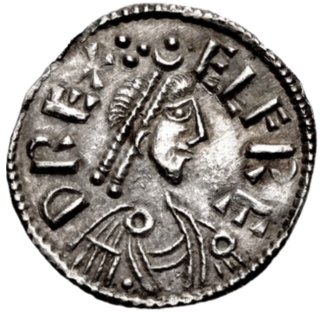
Alfred the Great was King of the West Saxons from 871 to 886, and King of the Anglo-Saxons from 886 until his death in 899. He was the youngest son of King Æthelwulf and his first wife Osburh, who both died when Alfred was young. Three of Alfred's brothers, Æthelbald, Æthelberht and Æthelred, reigned in turn before him. Under Alfred's rule, considerable administrative and military reforms were introduced, prompting lasting change in England.

Ceawlin was a King of Wessex. He may have been the son of Cynric of Wessex and the grandson of Cerdic of Wessex, whom the Anglo-Saxon Chronicle represents as the leader of the first group of Saxons to come to the land which later became Wessex. Ceawlin was active during the last years of the Anglo-Saxon expansion, with little of southern England remaining in the control of the native Britons by the time of his death.

The Kingdom of the West Saxons, also known as the Kingdom of Wessex, was an Anglo-Saxon kingdom in the south of Great Britain, from around 519 until England was unified in 927.

Æthelred I was King of Wessex from 865 until his death in 871. He was the fourth of five sons of King Æthelwulf of Wessex, four of whom in turn became king. Æthelred succeeded his elder brother Æthelberht and was followed by his youngest brother, Alfred the Great. Æthelred had two sons, Æthelhelm and Æthelwold, who were passed over for the kingship on their father's death because they were still infants. Alfred was succeeded by his son, Edward the Elder, and Æthelwold unsuccessfully disputed the throne with him.

Æthelbald was King of Wessex from 855 or 858 to 860. He was the second of five sons of King Æthelwulf. In 850, Æthelbald's elder brother Æthelstan defeated the Vikings in the first recorded sea battle in English history, but he is not recorded afterwards and probably died in the early 850s. The next year Æthelwulf and Æthelbald inflicted another defeat on the Vikings at the Battle of Aclea. In 855, Æthelwulf went on pilgrimage to Rome and appointed Æthelbald King of Wessex, while Æthelberht, the next oldest son, became King of Kent, which had been conquered by Wessex thirty years earlier.

Æthelberht was the King of Wessex from 860 until his death in 865. He was the third son of King Æthelwulf by his first wife, Osburh. Æthelberht was first recorded as a witness to a charter in 854. The following year Æthelwulf went on pilgrimage to Rome and appointed his oldest surviving son, Æthelbald, as king of Wessex while Æthelberht became king of the recently conquered territory of Kent. Æthelberht may have surrendered his position to his father when he returned from pilgrimage, but resumed the south-eastern kingship when his father died in 858.
Cynric was King of Wessex from 534 to 560. Everything known about him comes from the Anglo-Saxon Chronicle. There, he is stated to have been the son of Cerdic, who is considered the founder of the kingdom of Wessex. However, the Anglian King-list and parts of the West Saxon Genealogical Regnal List, instead says that Cynric was the son of Cerdic's son Creoda. Similarly, the paternal genealogy of Alfred the Great given in Asser's The Life of King Alfred, includes the name Creoda, while the account of the king's maternal ancestry in the same work calls Cynric son of Cerdic.

Cerdic is described in the Anglo-Saxon Chronicle as a leader of the Anglo-Saxon settlement of Britain, being the founder and first king of Wessex, reigning from around 519 to 534 AD. Subsequent kings of Wessex were each claimed by the Chronicle to descend in some manner from Cerdic. His origin, ethnicity, and even his very existence have been extensively disputed. However, though claimed as the founder of Wessex by later West Saxon kings, he would have been known to contemporaries as king of the Gewissae, a folk or tribal group. The first king of the Gewissae to call himself 'King of the West Saxons', was Cædwalla, in a charter of 686.
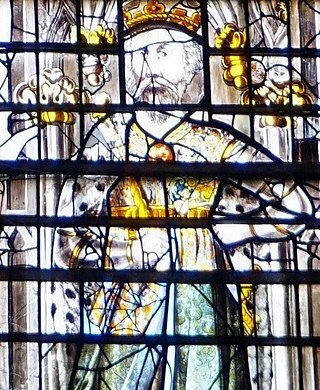
Ine, also rendered Ini or Ina, was King of Wessex from 689 to 726. At Ine's accession, his kingdom dominated much of southern England. However, he was unable to retain the territorial gains of his predecessor, Cædwalla, who had expanded West Saxon territory substantially. By the end of Ine's reign, the kingdoms of Kent, Sussex, and Essex were no longer under West Saxon sway; however, Ine maintained control of what is now Hampshire, and consolidated and extended Wessex's territory in the western peninsula.
Ealhmund was King of Kent in 784. He is reputed to be the father of King Egbert who was King of Wessex and, later, King of Kent. Asser's The Life of King Alfred identifies him as the son of Eafa.
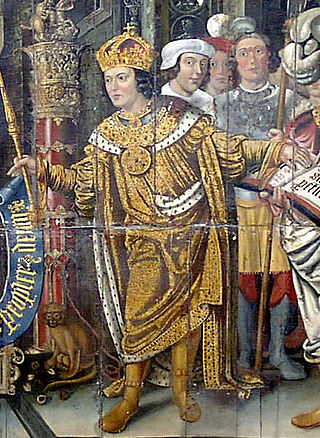
Cædwalla was the King of Wessex from approximately 685 until he abdicated in 688. His name is derived from the Welsh Cadwallon. He was exiled from Wessex as a youth and during this period gathered forces and attacked the South Saxons, killing their king, Æthelwealh, in what is now Sussex. Cædwalla was unable to hold the South Saxon territory, however, and was driven out by Æthelwealh's ealdormen. In either 685 or 686, he became King of Wessex. He may have been involved in suppressing rival dynasties at this time, as an early source records that Wessex was ruled by underkings until Cædwalla.
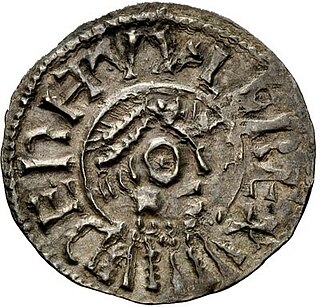
Beorhtwulf was King of Mercia, a kingdom of Anglo-Saxon England, from 839 or 840 to 852. His ancestry is unknown, though he may have been connected to Beornwulf, who ruled Mercia in the 820s. Almost no coins were issued by Beorhtwulf's predecessor, Wiglaf, but a Mercian coinage was restarted by Beorhtwulf early in his reign, initially with strong similarities to the coins of Æthelwulf of Wessex, and later with independent designs. The Vikings attacked within a year or two of Beorhtwulf's accession: the province of Lindsey was raided in 841, and London, a key centre of Mercian commerce, was attacked the following year. Another Viking assault on London in 851 "put Beorhtwulf to flight", according to the Anglo-Saxon Chronicle; the Vikings were subsequently defeated by Æthelwulf. This raid may have had a significant economic impact on Mercia, as London coinage is much reduced after 851.

Cynegils was King of Wessex from c. 611 to c. 642. Cynegils is traditionally considered to have been King of Wessex, even though the kingdoms of the Heptarchy had not yet formed from the patchwork of smaller kingdoms in his lifetime. The later kingdom of Wessex was centred on the counties of Hampshire, Dorset, Somerset and Wiltshire but the evidence of the Anglo-Saxon Chronicle is that the kingdom of Cynegils was located on the upper River Thames, extending into northern Wiltshire and Somerset, southern Gloucestershire and Oxfordshire, and western Berkshire, with Dorchester-on-Thames as one of the major royal sites. This region, probably connected to the early tribal grouping known as the Gewisse, a term used by Bede for the West Saxons, lay on the frontier between the later kingdoms of Wessex and Mercia.
Ceol is portrayed by the Anglo-Saxon Chronicle and West Saxon Genealogical Regnal List as King of Wessex for five to six years around 592 to 597 or 588 to 594.

The Iclingas were a dynasty of Kings of Mercia during the 7th and 8th centuries, named for Icel or Icil, great-grandson of Offa of Angel, a legendary or semi-legendary figure of the Migration Period who is described as a descendant of the god Woden by the Anglo-Saxon royal genealogies.

The Anglian collection is a collection of Anglo-Saxon royal genealogies and regnal lists. These survive in four manuscripts; two of which now reside in the British Library. The remaining two belong to the libraries of Corpus Christi College, Cambridge and Rochester Cathedral, the latter now deposited with the Medway Archives.
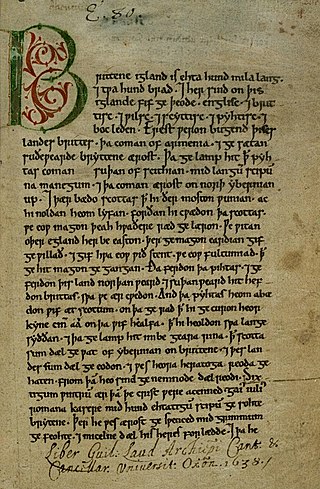
The Anglo-Saxon Chronicle is a collection of annals in Old English, chronicling the history of the Anglo-Saxons.
A number of royal genealogies of the Anglo-Saxon kingdoms, collectively referred to as the Anglo-Saxon royal genealogies, have been preserved in a manuscript tradition based in the 8th to 10th centuries.

The West Saxon Genealogical Regnal List is the name given in modern scholarship to a list of West-Saxon kings. It is one of the main sources for understanding the early history of Wessex and the attempts of its dynasties to project an image of dynastic stability.
References
- ↑ David N. Dumville, 'The Anglian Collection of Royal Genealogies and Regnal Lists', Anglo-Saxon England, 5 (1976), 23–50 (pp. 34 and 37).
- 1 2 David N. Dumville, 'The West Saxon Genealogical Regnal List and the Chronology of Early Wessex', Peritia, 4 (1985), 21–66 (pp. 59–60).
- ↑ Asser, p. 1
- ↑ Walker 1956, p. 185.
- ↑ Kirby, pp. 22-24
- ↑ Stevenson, p.40